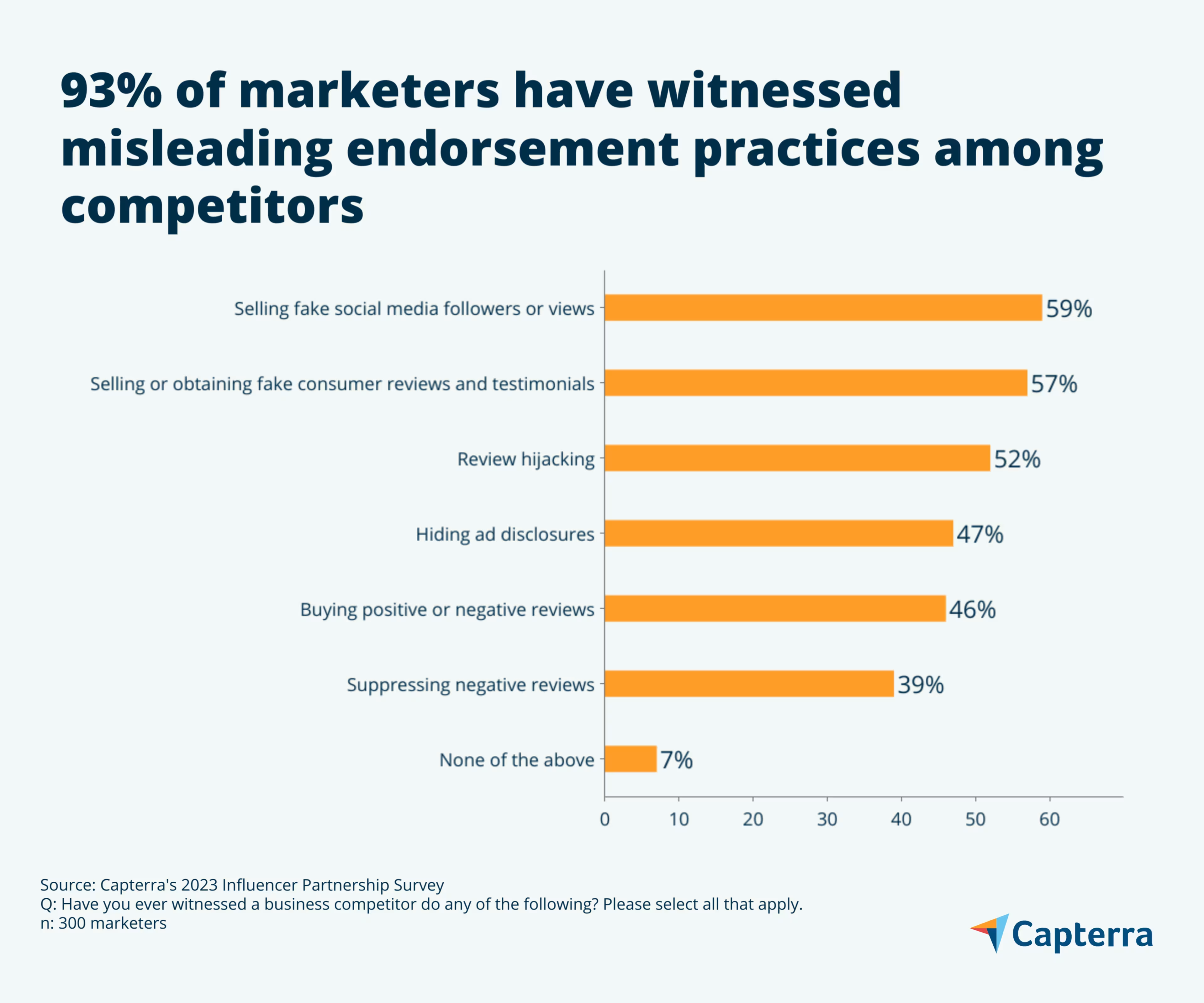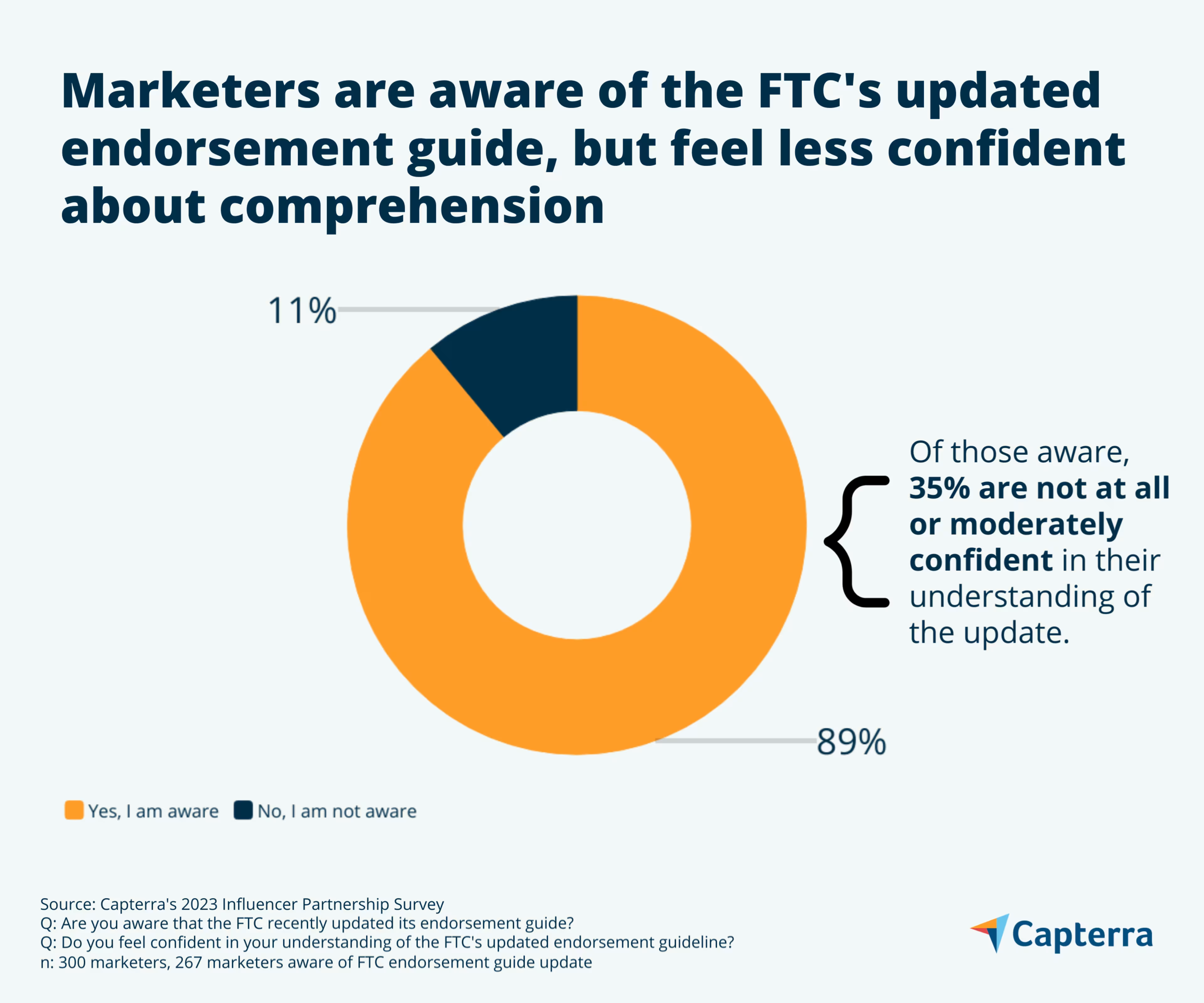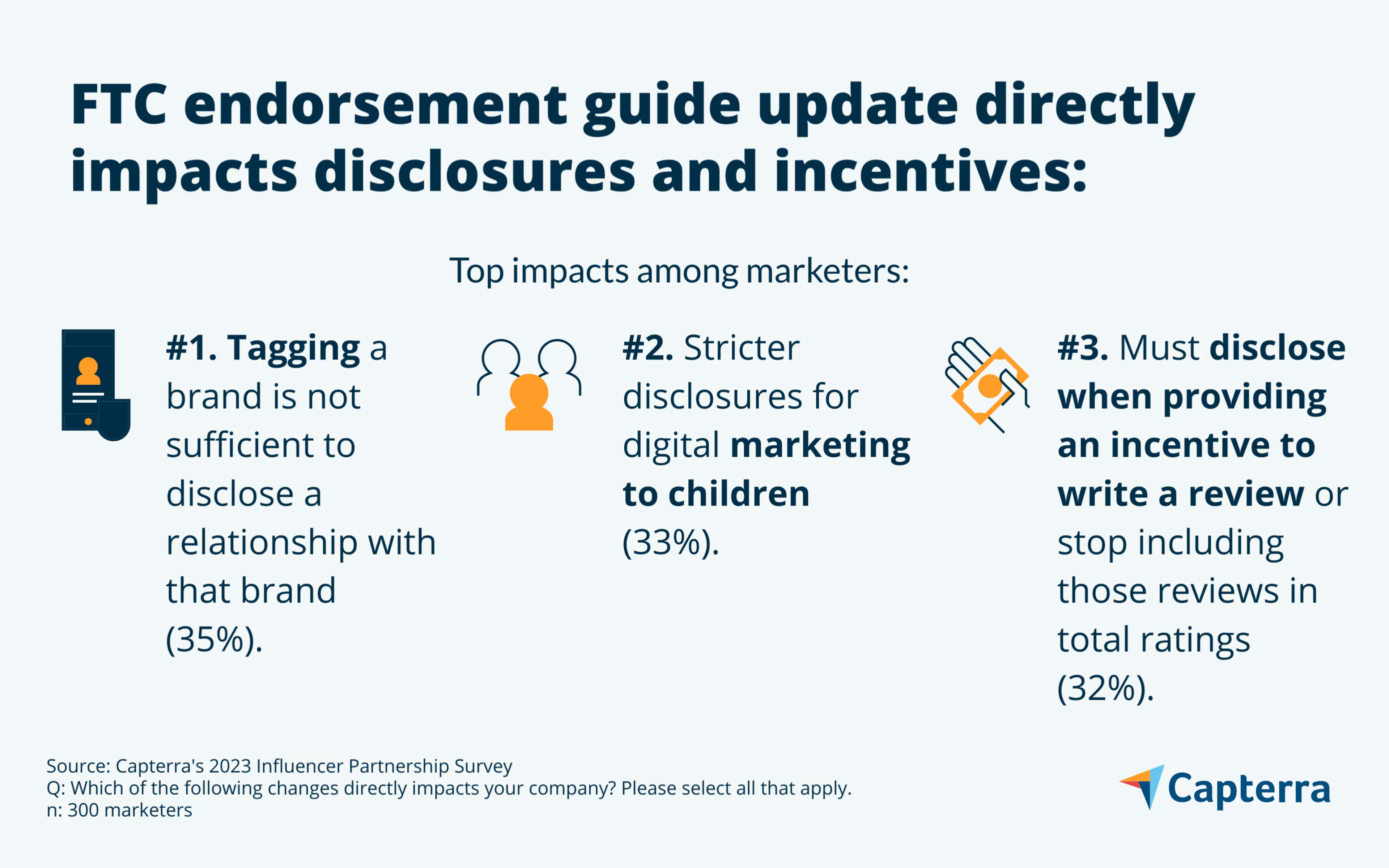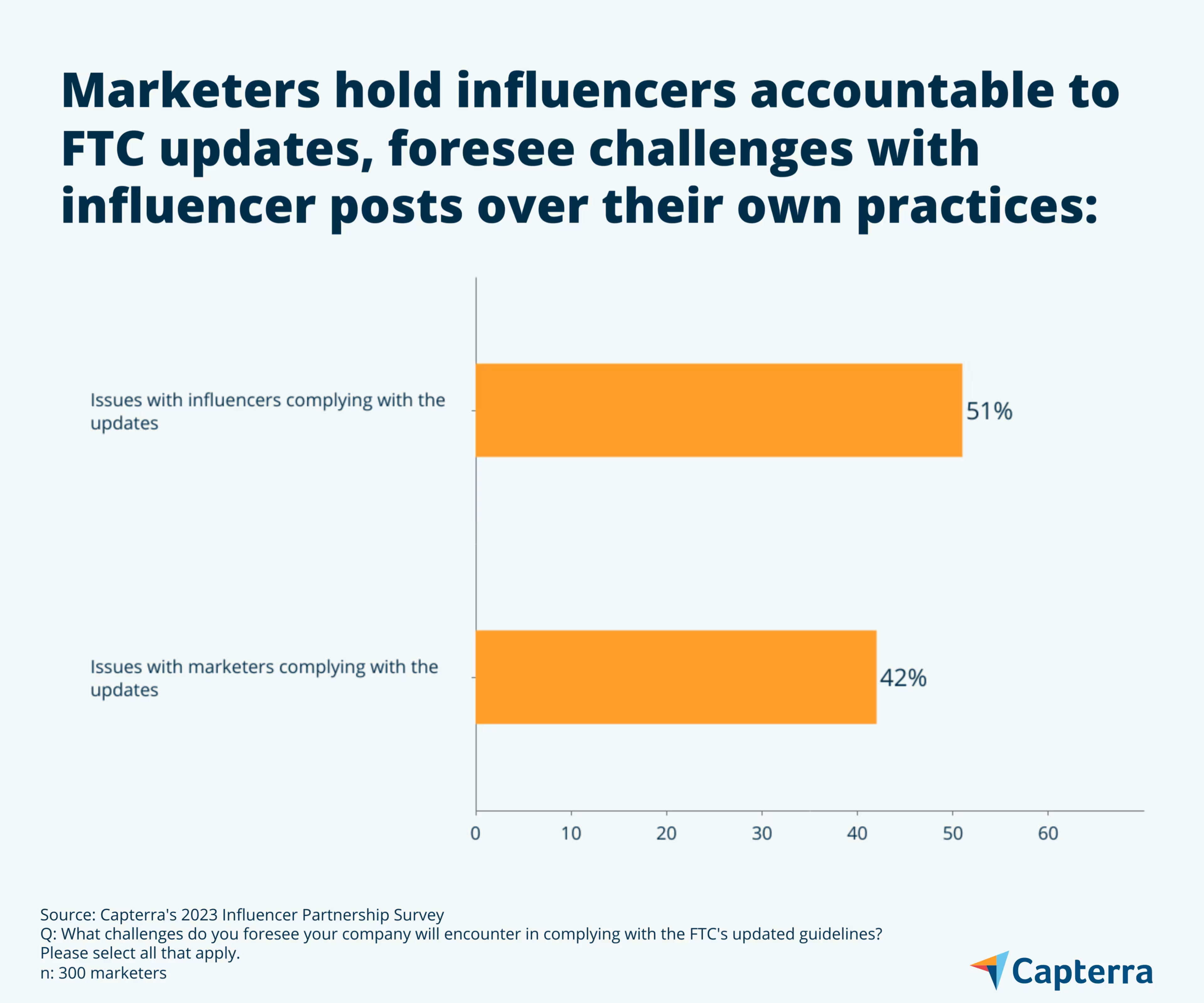Do you need to adjust your influencer marketing budget to comply with the FTC’s endorsement guides?
For the first time in 14 years, the Federal Trade Commission (FTC) updated its endorsement guide which gives recommendations to businesses for sponsored content, influencer marketing, and the use of commercial online reviews.[1]
For marketers that work on influencer campaigns, this isn’t necessarily bad news. Many are convinced that the stricter standards and requirements will ultimately lead to more authentic endorsements that resonate with audiences.
Capterra’s Influencer Partnership Survey* finds that a majority (80%) believe the updated endorsement guide will ultimately have a positive impact on their company’s ability to achieve social media marketing objectives. Additionally, 73% of marketers believe the update will help consumers see influencer partnerships as more trustworthy and reliable.
But this doesn’t mean there won’t be challenges with compliance as companies adjust their endorsement practices—76% feel the updated guidelines are too restrictive. And with 92% of marketers believing that their company will factor in the updated guide when planning influencer budgets for the following year, it’s clear that disclosure is a necessary responsibility that requires thought out action.
Our data reveals how recent updates to the FTC’s endorsement guidelines impact the changing landscape of influencer marketing and provides best practices for disclosures so you can stay compliant and provide more transparent influencer marketing campaigns.
/ Key findings
Stronger guidelines driven by fakers on social media: 59% of marketers say they have witnessed the selling of fake social media followers or views; 57% have witnessed selling or obtaining fake customer reviews or testimonials.
Under the new guidelines, disclosures must be clear and obvious: Tagging a brand does not suffice as a clear disclosure under the updated guidelines—35% of marketers say this directly impacts their company.
Marketers are concerned about how influencers will comply: 95% of marketers foresee challenges complying with the updated guidelines. 51% are concerned with influencer partners complying.
Changes not likely to have a negative impact on future influencer marketing budgets: Only 14% of marketers believe their company will decrease budget to future influencer campaigns due to potential compliance costs.
Marketers believe compliance leads to more authentic endorsements: 73% of marketers believe that the FTC endorsement guide update will influence the credibility of influencer endorsements among consumers, helping them to see partnerships are more trustworthy and reliable.
Despite high confidence in current disclosure practices, infractions run rampant
Working with influencers is one avenue to stand out and add authenticity to your social media marketing campaigns. When an influencer posts about your brand, you get exposure to their audience where there is typically preestablished trust and attention.
/ How effective is influencer marketing?
Among marketers whose companies engage in influencer marketing initiatives, 81% say their company is getting extremely high or high value from those initiatives. Additionally, 94% say they are very or somewhat satisfied with their company’s influencer marketing policies (e.g., agreements between influencers and the business such as terms of content creation or distribution, legal protections, compensations, etc.).
However, anyone that works with influencers to endorse or recommend their brands also needs to ensure those relationships are obvious and transparent to the public. According to our survey results, 92% of marketers believe they are doing a good job of disclosing ads or endorsements on social media. But when we asked marketers if they had ever witnessed a competitor being untruthful or misleading, there were several mentions of misconduct:

The most common infractions involve inflating social media engagement and positive reviews. Nearly three in five marketers say they have witnessed the selling of fake social media followers or views. Furthermore, several have also witnessed selling or obtaining fake customer reviews or testimonials (57%) and 52% have seen review hijacking (e.g., the repurposing of a consumer review written for one product so that it appears to be written for a different product).
This points to the high importance of brand authenticity and credibility. A substantial number of followers, positive reviews, and engagement all serve as social proof that can sway consumer purchase decisions through establishing reliability of the brand or business. That’s why it’s even more detrimental when bad actors misrepresent themselves, leading consumers to distrust social media marketing or advertising claims.
/ How to identify and avoid fakers
To avoid partnering with influencers that are misrepresenting their number of followers or views, look for inconsistencies. Do they have a huge number of followers but low engagement? Sudden spikes in followers or views? Inconsistent or sometimes irrelevant posts? These are all red flags to look out for. Additionally, consider leveraging tools or agencies that can help with the vetting and selection of influencers that make the most sense for your brand’s goals and specific needs.
Most marketers are aware of the FTC update but struggle with comprehension
With the addition of several key changes, the FTC’s update has introduced new levels of complexity that can be difficult for marketers to navigate. Their updated FAQs alone include more than 100 questions on how to handle disclosures or endorsements across various platforms[2], even delving into artificial intelligence. This proliferation of guidance can be overwhelming when attempting to maintain compliance across different platforms and formats.
Our data suggests that low comprehension of the update may be contributing to endorsement infractions. A majority of marketers (89%) say they are aware that the FTC recently made the update yet more than a third (35%) are not at all or are only moderately confident in their understanding of the update.

The FTC update directly impacts marketing initiatives—what you should know
If you work with influencers to endorse or recommend your products, you need to comply with the latest best practices and guidance from the FTC. These changes could impact how brands and influencers disclose sponsored content, and at a more macro level, it could effect budgets or even strategy.
And while breaking the guidelines is not against the law, they do provide specific guidance on what practices may be in violation under Section 5 of the FTC Act, which prohibits deceptive advertising practices and can result in legal action or associated fines for infractions[3]:
“Practices inconsistent with the Guides may result in law enforcement actions alleging Section 5 violations. Law enforcement actions can result in orders requiring the defendants in the case to pay money that goes back to consumers harmed as a result of their violations and to abide by various requirements in the future. Moreover, if the defendants received a Notice of Penalty Offenses regarding endorsements and then engaged in certain deceptive or unfair endorsement practices, the FTC could seek substantial civil penalties.”[2]
Notable updates for marketers
#1. Definition of “endorsement” and “clear and conspicuous”: The FTC broadened the definition of “endorsements” to clarify that it can include tags in social media posts, fake reviews or reviewers, and virtual influencers. Additionally, the FTC added a definition of “clear and conspicuous” disclosures along with a warning that a platform’s built-in disclosure tool might no longer be adequate.
Examples
Tagging a brand is not sufficient to disclose a relationship with a brand.
Ad disclosures need to be overlaid in videos (adding #ad in the captions of videos is not enough).
You can't hide disclosures behind links.
“Thank you” or “Thanks brand” is not a sufficient disclosure.
“De-influencing” campaigns require disclosure.
Disclosure in the comments for posts is not a sufficient disclosure.
Disclosing sponsored content solely at the bottom of a blog or advertorial is not a sufficient disclosure.
Almost anything influencers get for free needs to be disclosed.
"Gifted," by itself, is not a sufficient disclosure.
#2. Reviews and incentivized reviews: The FTC provides new guidance for reviews regarding not procuring, suppressing, organizing, upvoting, downvoting, or editing consumer reviews in ways that likely distort the consumers’ actual perceptions of a brand or product. The FTC also addresses incentivized reviews, reviews by employees, and fake negative reviews.
Examples
You can't contact customers who left negative reviews and ask them to change or delete their reviews.
Reviews for multiple products need to specifically disclose which content is sponsored and which isn't.
You can’t send review links targeting only satisfied customers.
You must disclose when providing an incentive to write a review, or stop including those reviews in their total ratings.
#3. Liability and advertising to children: The FTC provides a clearer explanation of the potential liability that advertisers, endorsers, and intermediaries (such as agencies or PR firms) face for violating the law. The FTC also highlights special concerns with advertising directed at children.
Examples
Advertisers must take responsibility for the actions of their endorsers.
Advertisers can be liable for an endorsers' violations.
An advertiser’s liability could extend to “deceptive endorsements” and not just whether an endorser’s statement is true.
Disclosures that would not ordinarily be questioned in ads directed toward adults may be questioned when directed to minors.
Let’s take a look at which changes marketers say directly impact their company the most:

Many of the changes identified involve being even more upfront about disclosures and any incentivized relationships between brands and influencers. Businesses must be careful to clearly differentiate any branded content, going above and beyond what they are probably doing currently in the realm of disclosures.
/ Will the new guidelines impact influencer planning and budgeting?
According to marketing professionals, probably not. While a majority (92%) believe that their company will factor in the updated FTC endorsement guide when planning influencer budgets for the following year, the true costs associated with disclosures appear to be only a small slice of the budget allocation pie.
Even though three in four (76%) marketers agree that the updated guidelines are too restrictive, only 14% believe their company will decrease budget to future influencer campaigns due to potential compliance costs. In fact, 51% predict their company will increase budget to accommodate disclosure efforts.
Marketers see the bright side of tightening disclosure standards despite majority anticipating challenges with compliance
Adapting to new restrictions can seem overwhelming—95% of marketers foresee that their company will encounter challenges trying to comply with the updated guidelines. Their top concern is where they lack control in how or what an influencer might post.

Additional challenges with compliance cited by marketers include a general lack of understanding surrounding the updates (43%) and inadequate or no training about the updates (42%).
But 80% of marketers believe that the FTC’s updated endorsement guide will have a positive impact on their company’s ability to achieve social media marketing objectives. Additionally, 73% of marketers believe that the FTC endorsement guidelines update will influence the credibility of influencer endorsements among consumers, helping them to see these partnerships as more trustworthy and reliable.
As consumers have become increasingly conscious of the ethics their brands support, businesses that are transparent about their sponsorship practices have a leg up. Honest and transparent marketing helps establish a positive brand reputation, builds trust, and encourages customer loyalty.
Tips for compliance with the FTC’s new guidelines
The best defense when working with influencers is to clearly communicate your expectations and agree on disclosure terms prior to engagement.
Below are some examples of what marketers are currently doing to comply with the FTC’s updated guidelines and what you can do to maintain transparent endorsements and ad disclosures:
Make sure your agreements with influencers are clear and explicit: Your company should have documented influencer marketing policies and procedures. In fact, 59% of marketers say they are currently updating their influencer partnership policies and practices to ensure compliance with the updated endorsement guidelines.
Incorporate training and support materials: According to our survey, 58% of marketers say their company is communicating with employees about disclosures and endorsements in general. Another 42% say they plan to create guidebooks or manuals about endorsements. Keeping employees informed is critical as the world of endorsements will continue to evolve and adapt to the nature of online communications.
Conduct regular audits of influencer marketing content: 58% of marketers say they are increasing time spent monitoring or reviewing influencer content. Periodically review your influencer partnerships and content to ensure compliance. One avenue to achieve this is through leveraging social media monitoring or analytics tools to streamline compliance. Some tools even offer built-in features for adding disclosure labels or highlighting of endorsements.
Leverage legal services: Depending on your company’s budget, you can also consider using legal services. In fact, 42% of marketers say they plan to consult legal experts or compliance specialists to ensure compliance with the new guidelines.
The updated endorsement guidelines highlight the importance of maintaining transparency and consumer trust in the often volatile world of marketing. While challenges may arise, proper training, up-to-date disclosure practices, and support guidance are key to help marketers avoid potential fines and reputation damage. Doing so can also foster better marketing materials, improved consumer trust and authenticity—a win-win for all parties involved.
If you liked this report, check out some of our other research on the latest marketing trends:

